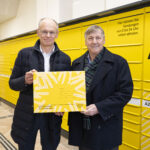
Logistics chief sees little to fear as foreign raiders circle the City. Interview with John Allan
John Allan has begun German lessons as he sees Exel's merger with DHL Logistics as a chance to finish the job he started, he tells Angela Jameson.
IN THE past few months, it has felt as though corporate Britain was under assault.
However, after a week in which a Spanish construction company made a play for Heathrow and the Government of Dubai clinched our biggest ports, there is one chief executive of a FTSE 100 company who can attest to the fact that there is life after the foreign takeover.
John Allan is seven weeks into his new career managing the newly merged Exel and DHL Logistics. In November, when The Times Power 100 list was compiled, he still led Exel, one of Britain's leading companies. He ranked No 75 on the list because of that and his non-executive directorship of another FTSE 100 company, National Grid.
Now that Deutsche Post has completed its Pounds 3.7 billion takeover of the freight company and merged it with its own DHL Logistics, Allan will be dropped from our list. Not that it bothers him, unduly. He says that he has adapted "very easily" to his change in status, astonishing some of his friends, who, presumably, thought this affable English gent would hate to be beholden to suits in Bonn.
"My identity is not tied up with being a chief executive," he says. "Once they had asked me if I would stay, I was very happy to do that." After 11 years with Exel, and something of a reputation as a deal-maker and consolidator in the freight world, the hunter became the hunted. The man who effectively created Exel out of the merger in 2000 of Ocean Group and National Freight Corporation, then snapped up Tibbet & Britten in 2004, had to back down in the face of a German juggernaut.
He does not see the takeover by the larger group as evidence of strategic failure: "We created a business that was attractive to others, and they came along and put in an offer that we had to put to our shareholders. The shareholders quite rightly decided that jam today was preferable to a high degree of probability that there would be jam tomorrow.
"The work that we had been doing in building Exel was a long way from being finished. Now I have the chance to finish it. It's actually quite a compatible merger of businesses; both the acquirer and the acquired had a similar view of where the market was going."
So, at 57, he is beginning twice-weekly German lessons, even though he could quite easily have never worked again. "Yes I have made a lot of money – by my standards, because I started out with next to nothing – but it hasn't reduced my desire to build something of substance."
Allan's a bit of a workaholic, if truth be told, and has not had a day's unemployment since he left university in 1970. No gap years, no business school, no going travelling for this focused mathematics graduate.
Top of the list of things that he wants to do when eventually he does stop is to brush up the A-level French that he still uses by living in France for a while.
"Perhaps Paris," he muses. Going plural, the fashionable phrase of rushing from one non-executive role to another, does not appeal.
Now, though, he has his work cut out, combining the 110,000 Exel people with the 140,000 DHL people. Surely, there must be quite a few Basil Fawlty-style jokes back in Bracknell, Exel's base? "Of course there are stereotypes, but the interesting thing is how similar in terms of attitude my new German colleagues are on the management board.
"Culture isn't something that belongs to the board and which one can change by decree. Culture is more of a description of what it is that binds people together.
I'm much more struck by the genuine resemblances than the differences."
Exel itself was a product of mergers and by no means homogenous. Then there are the multinational managers, spread across a business that operates in 135 countries. "No one is trying to impose a culture on anyone else," he says.
The idea of pursuing a business career was planted at Edinburgh University, where Allan was involved in student politics – although not for a particular party – and also had a hand in running a student business, a stationery supplier to colleges in Scotland.
Unilever offered him a sought-after graduate traineeship when he left and he started working in a brand management role, like so many of Britain's most successful executives. "Someone had told me that marketing was good to get into; I don't think I really knew what it was," he says.
He calls Lever Bros a fantastic, formative experience. There he learnt the importance of customers, that good people are the differentiator between businesses and that good businesses are built over the long term, not overnight.
"I took that all in like a sponge and it really became a part of the fabric of my management beliefs," he says.
After that it was a steady progression up the ranks at Bristol-Myers, Fine Fare and BET, where he was made a main board director. At 46 he got his big break, when Ocean Group approached him to be chief executive. For someone who believes that it takes a long time to build a business, it was a perfect opportunity. "Making a difference to a business takes time, but these days it's a fairly rare privilege to have a chance to see that through.
"I was lucky because the business was small, unfashionable and not under scrutiny.
Some new chief executives are forced to make decisions faster than they should.
"One of the myths of the last 20 years is this sort of cult of the CEO – that someone can come along and swing an axe or wave a magic wand or something and transform everything overnight."
Successful businesses are about teams, and even the chief executive cannot be more important than the team.
"I would be very worried if the day I retired the share price plunged. You haven't done a very good job as a manager if you find yourself in a situation where you are totally dependent on one individual."
His Unilever grounding shows in the companies that he most admires. He is a long-term watcher of Procter & Gamble, which he says is a good example of a really successful business over a number of generations.
"The people who run it are not household names, but there is a very strong ethos and culture of management that probably transcends any one individual. It is the same at L'Oreal. Of course, they have had a very charismatic chief executive there, so there can be a relationship between the two things, but it doesn't have to be that way," he says.
There is a lot of psychology to succeeding in business, he says, and bosses have to be able to convince their team that they can be winners. Sainsbury's, he says, was a business that had lost the will to win but has regained it again under Justin King's stewardship. Whether it is second or third in terms of market share matters less, now that it is confident again.
If confidence is what it is all about, Exel's is undinted by its foreign marriage.
"Hopefully," Allan says, "we can show we can be even more successful as a combined business."
POWER CV
Name: John Allan
Age: 57
Home: Virginia Water, Surrey
Education: BSc (Hons) Mathematical Science, University of Edinburgh
Career: Began his career in 1970 with Lever Brothers on its high-prestige management development scheme
1973: Joined Bristol-Myer company as a marketing manager in its consumer products division
1977: Joined Fine Fare, the supermarket group, as a marketing director and worked his way up to director and general manager of the retail division
1985: Joined the support services group BET, initially in the building products and security division
1987: Became a main board director of BET
1994: Recruited as chief executive of Ocean Group. Exel was formed through the merger of Ocean Group and Exel in 2000
Other interests: Non-executive director of National Grid, a member of the CBI president's committee and of the campaign board of the University of Edinburgh Development Trust. Was president of the Freight Transport Association from 2003 to 2005
Hobbies: opera, reading, friends and family,
learning German
THE LEADER QUESTIONED
Q Who is or was your
mentor?
A I've learnt a lot from some of the many good managers I've worked with, but I've also learnt from the not-so-good. Learning doesn't just move in one direction, though; I've learnt a great deal from some extremely good people who've worked for me.
Q Which businessman or woman do you most admire?
A I don't know who to single out. The businesses that I most admire are the businesses that have built sustained, quality businesses over a long period of time, often in quite tough industries.
Q Do you read books on management? If so, which has influenced you the most?
A Relatively rarely, although I do buy them. Peter Drucker was a seminal influence on me as a young manager, but a lot of management writing is pretty unexciting.
Business coverage in magazines and papers is hugely better now than it used to be.
Q Which is more important: what you know or who you know, and why?
A Knowing how to do things. The question implies there is an antithesis between knowing facts and knowing people, but I think there's actually a third way, which is understanding processes – how to get things done and find things out.
Q What does leadership mean to you?
A Creating a team, setting performance standards and behavioural standards and giving the business the will to win. When I joined Ocean, my contribution was getting some good people together and giving the company a sense that it was going somewhere.
Q If you could change one thing about the business, financial and commercial environment, what would it be?
A I think we are putting at risk our future as an economy by failing to get our transport infrastructure right. We need to invest more in trunk roads and motorways, even though it's controversial, and in ports and airports. We urgently need to invest in our passenger transport system, if only to get private cars off the trunk roads. There isn't a single magic bullet that would fix the transport system, everything is linked. If I were to wave a magic wand, I would also do something about the educational system, even if that means in the medium term slightly higher taxes.
Q What is the most important business event, good or bad, to occur in your working life?
A Being given the opportunity to become chief executive of Ocean. I was lucky to get the chance to do something in a smaller, old-fashioned industry where I could make a difference without having the scrutiny that a chief executive of a major public company is under.
Q Does money motivate you?
A Not hugely. It's nice to have some rather than not to have it. My prime motivator is continuing to contribute to something that is long term and worthwhile and offers employment to people around the world. I think our people can go home at night and feel they are doing something to be proud of.
Q What gadget or piece of technology can you not do without?
A A BlackBerry. I used to carry a PC around with me, just about everywhere, but now I'm liberated.












